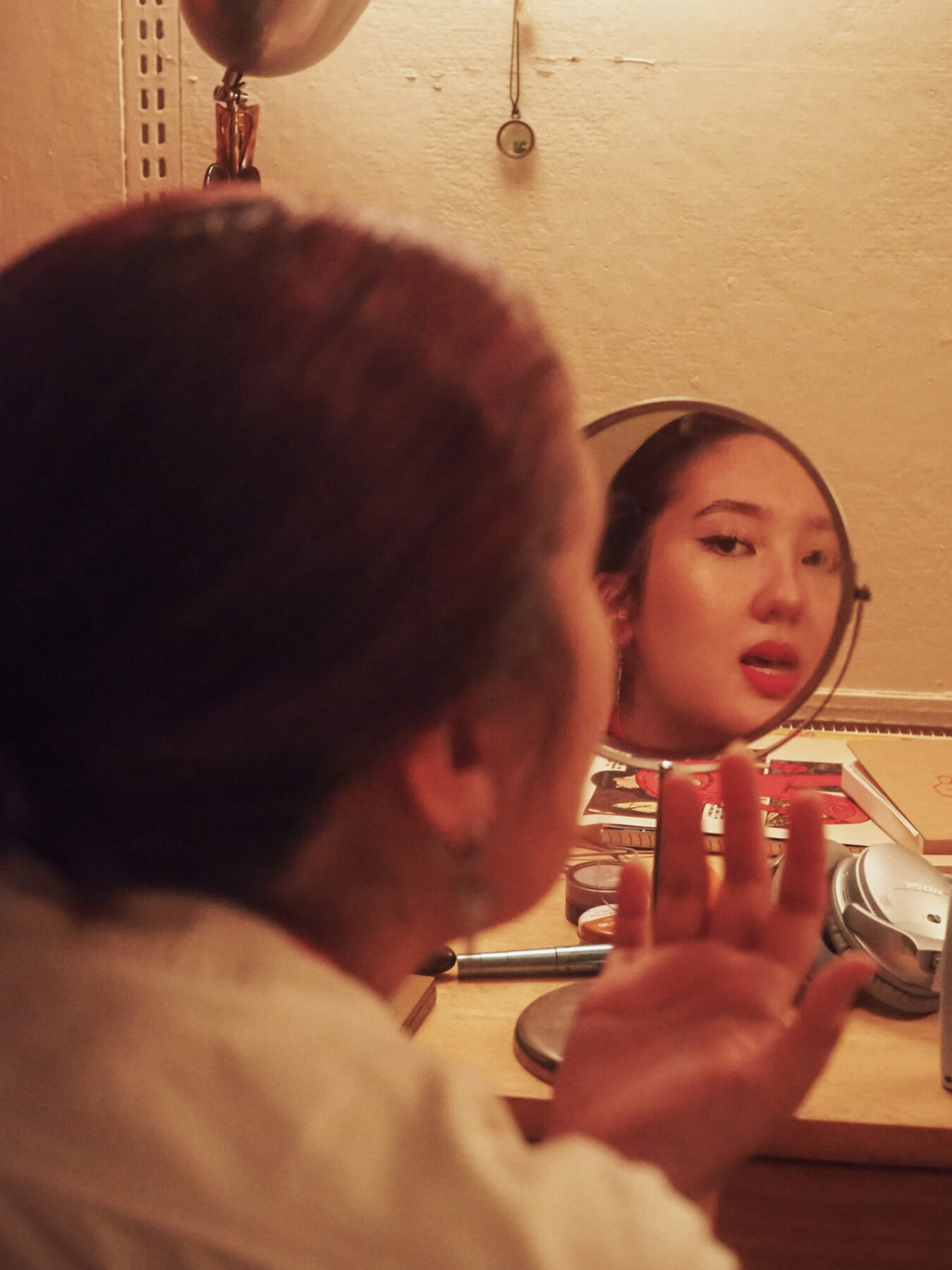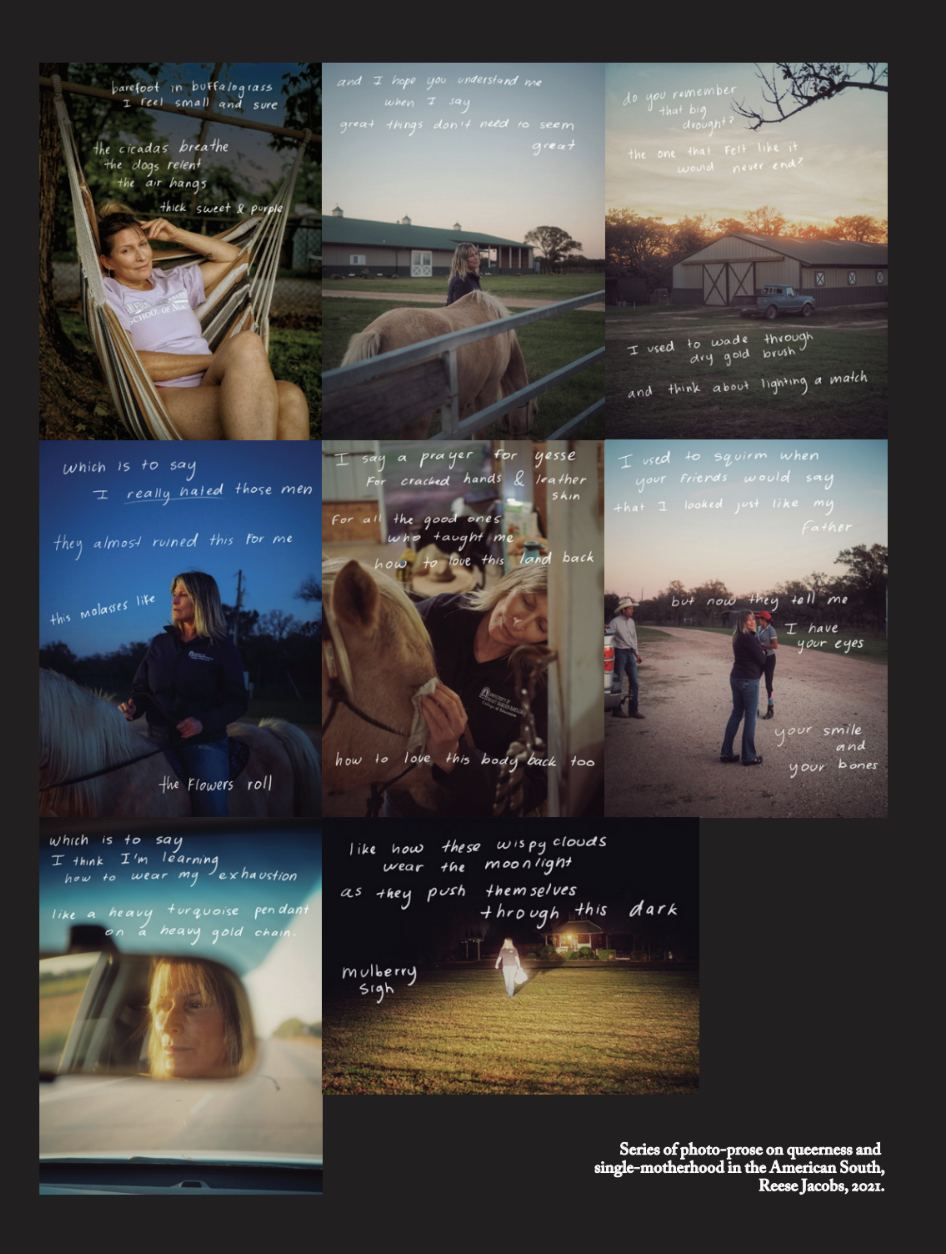My favorite photo Reese has taken of me is the one posted to his Instagram in between fragmented shots of his body. I’m applying my favorite red lipstick, staring into a silver hand mirror in the warm lighting of my old freshman dorm in Welch Hall. He’s captioned it, “this is my body broken for you, or whatever.” When I ask him about it, he gleefully tells me it’s a reference to the Bible, when Jesus offers his body as the wine and bread of communion. Corinthians 11:24: Take, eat; this is My body which is broken for you. “Oh my God,” Reese exclaims, “that goes so hard. I wish I thought of that!”
I don’t think that it was intentional for Reese to place me in the midst of his broken body, but I love to think of myself there. Once, I wrote to my friend Jabez that in his eyes I was broken and remade into the image of a new God. To me, this is what it means to have queer friends. Or more like, this is what it is to recognize yourself in someone. Here is my body, broken for you. In between the fragments of our bodies and Gods lie our hearts and the art that comes from them. As queers, we are reimagining it all—and in these bodies, we find something holy.

I was not raised religious. I spent the last summer wandering throughout Italy, learning about saints and their golden sins. In every Catholic church, there was the bloodied body of Christ hung for all to see, his weeping mother posited even higher. I carried bad luck with me all that summer and wondered if the tombs of the priests I had so carelessly walked over could sense my irreverence. Even worse was my treatment of the Sistine Chapel. You’re not supposed to take pictures, but I did anyways. All those glorious man-bodies, bulging with cheek and muscle. I wondered if I was going to Hell. I posted them to my Instagram and wrote, I love queer people. I hope you all live long, beautiful lives. I hope the journey is abundant and kind. I hope you find your people. I hope it’s everything you wanted and more.
All this to say that I am painting a new kind of citizenship here. I am reimagining God in the image of an erotic, homosexual, and queer personhood. I hope you will forgive my irreverence.
This is not to say that Reese is a god. Reese is queer. Reese is Jewish. Reese is from Texas. Reese loves Houston. We share a love for gold jewelry. He loves his mother and his older sister, Georgia. I can say all of these things, but it is hard to impart what I really think embodies Reese, the parts of him that aren’t so easy to compartmentalize. A smooth, low-hanging voice. Slim-fingered hands he throws up in the air like someone’s exasperated Southern grandmother, half prayer and half surrender. And then there’s what could only be his: a kind of shining generosity, one that can’t help but spill over his fingertips and into the art he makes.
The photographer’s gaze is often a site of transaction; to desire a certain shot, to capture a moment and steal its private passing, can be a selfish or twisted act. But Reese’s warmth is inescapable in his shots—every subject is given something precious, a certain beauty we can witness only through his gaze. He tells me that striving to capture that warmth in his subjects “was always the sentence I was trying to write. That I couldn’t find the words for. I feel like I finally found my stride…with capturing this feeling of softness and warmth and romanticism that I associate with my home and the people that I love and the people that make me feel safe.”
There are dozens of his photographs that come to mind when he says this—his sister haloed in golden light and peering through a shredded window screen, a Mona Lisa-esque smile on her face. The regal grace of his mother as she sits astride her horse, the gentle blue backdrop of a Texan twilight behind her. That first photo from my freshman dorm, and the sureness I felt in his gaze behind me as he witnessed and captured a moment I felt beautiful.

He continues. “A lot of my photography has shifted to those moments of feeling good. If you go back and read my essays, in any piece of art that I produce, I have this fascination with this very somatic feeling of warmth, of wetness…I think it’s a sensation that makes me feel safe. That essay about Houston starts out with ‘thick, fleshy one-ness.’ That’s the closest thing I’ve come to describing it.”
I think of an interview I once read with poet Ocean Vuong, where he wrote: Is it possible for queer joy—outsider-hood—to be so mundane that, in that simplicity, it’s radical? To insist that this joy does not have to end in tragedy, in death, in loss? We can just simply sit at a table and be okay for the next five minutes. I think of the photos Reese captures of his loved ones—wherein we are well and whole. We are fragmented and united. Our untethered, rehumanized beauty is radical. We have all the warmth of a home.
On this Reese and I agree: queerness is a mode, an ethic. Brimming with sexuality, but also a descriptor for the ways in which queer, erotic autonomy defies the goals of the nation-state. His art is a production of this philosophy, of desire manifested and realized. As the soft, pink light of our common room shines over his pale hands, he says to me: “Photography is about aesthetics. What you see, what you envision. I’ve always been attracted to, obviously, men. But that used to be something so shameful and painful for me. I think art started as a way to navigate those feelings…the fact that I was attracted to these men, these male bodies and male forms, became a source of inspiration…It was about reclaiming the things I’ve always wanted to take pictures of. I’ve always wanted to look at men.”
Now I am offering you my own remembrance. I remember being a queer child and growing up feeling part-predator. I wonder how it left its mark—thinking I was half-human. I craved love. I still do. Love, full and whole. I was always really good at that. I give it to other people fast and easy, just the way I like it. I love the ritual of it. I love the act of honoring, of desire and its release; I love the moment of yes, yes I will do this, I will do it again and again and again until I am filthy with it. These are the echoes of a childhood spent seeking love. These are the manifestations of our very human desire.
Queerness is a lifeforce, a freedom. Desire is a long-held wish. And pride is still protest. We are still freeing ourselves, still forging the world in which our desires are no longer paid for in blood.
If I could write my own version of a Corinthians-like prayer, it would begin like this: here lies the flesh, the body, the reckoning of its blood and warmth. We are not Jesus Christ’s bloodied body hanging from the church walls, but his still-living desire. I will not invoke the familiar sins. I am tired of blood; I’ve grown weary of sacrifice. I am realizing that not everything is a loss. I am holding the peace with me, reveling in the sound of a heartbeat both warm and wild; I am realizing that my heart was looking for friends like Reese for a long, long time.
We should all be so lucky to have queer friends. Queer people should make the good art and embrace their friends and be radically happy, merrily and religiously and relentlessly. Singer Phoebe Bridgers said, I wanted to see the world through your eyes until it happened. But my friend, I want to see the world through your eyes if only to see the beauty you render it. I want the world to see what I see, too.
I sometimes think that in fifty years, when our bones have dried up, I’ll crawl into that good place and find a field of golden hay, a slim-fingered hand waiting to guide us to its center. There will be a big round table, oak and sturdy, and we won’t remember things like the open wound of our queerness or who we used to be. I’ll feel a touch on my shoulder and turn to see the face of my old friend, and feel for a second what it used to be like in the warmth of his gaze. We will talk with our companions and laugh for hours. There are no gods. Not really. Not here.
Lana Perice is a sophomore in Trumbull College.

